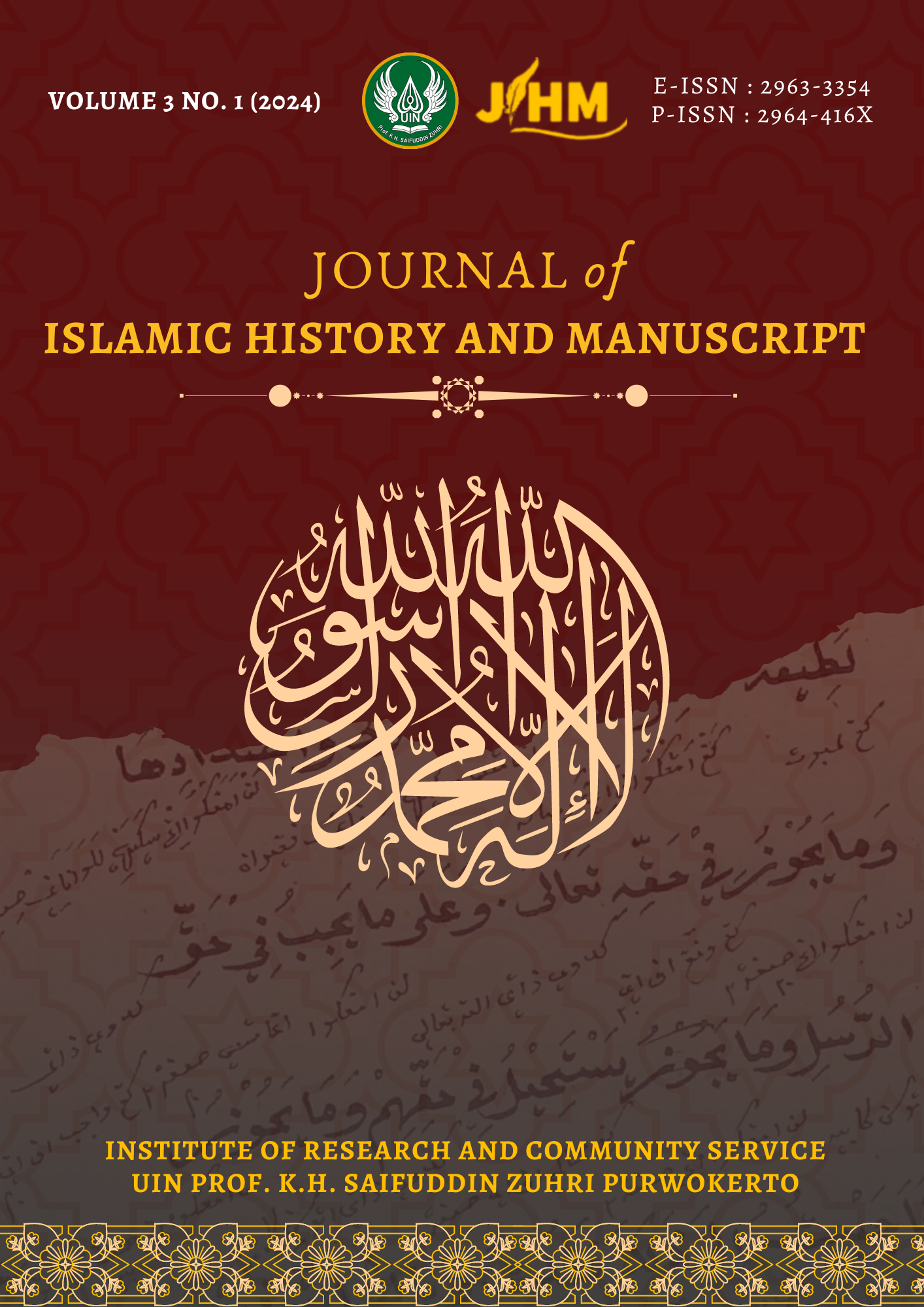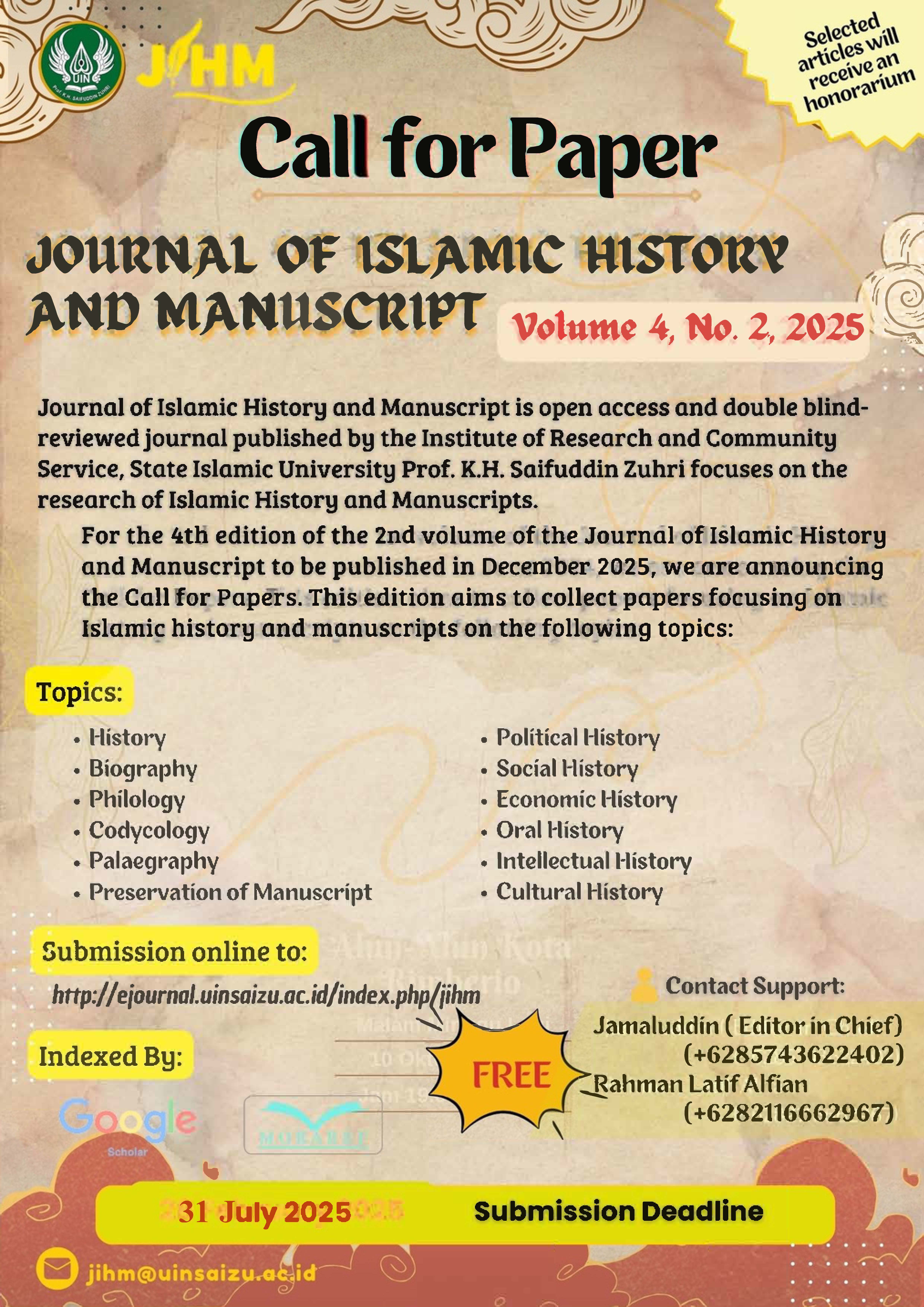Sufi Tradition as Legitimization of Guardianship in The Java: The Study of Manuscripts of Babad Demak Pesisiran
DOI:
https://doi.org/10.24090/jihm.v3i1.10732Kata Kunci:
Sufi Tradition, Saint of Java, Babad Demak PesisiranAbstrak
The development of Islam in Java is inseparable from the role of wali as a preacher of Islam. The title of wali is given to selected people who get privileges such karamah and knowledge about Islam. This research aims to analyze sufi tradition carried out by Java sufi until they reach the degree of wali. This research uses a qualitative method with descriptive analysis. The research source used is Babad Demak Pesisiran, which was transliterated by the Indonesian Education and Culture Ministry in 1984. The result of this research is about sufi tradition carried out by wali, such as fasting to curb the lust (tan dhahar rikala rina), praying all night long to get closer to God (tan sare rikala wengi), and solitude by meditating in a quiet place such as mountain or home. This condition happened because of Sufi's influence and the mysticism values that developed in Java.Referensi
An-Naisaburi, A. Q. A. K. H. A.-Q. (1046). Ar-Risalatul Qusyairiyah fi ’ Ilmit Tashowwuf.
Aziz, D. . (2015). Akulturasi Islam dan Budaya Jawa. Fikrah, 253–286.
Brandes, J. L. A. (1897). Pararaton (Ken Arok) het boek der Koningen van Toemapel en van Majapahit.
Brandes, J. L. A. (1899). [Bladvulling.] De tekst van de proza bewerking van de Babad tanah Djawi gecestigeerd.
Djajaningrat, H. (1995). Local Tradition and The Study of Indonesia History. In Soedjatmoko (Ed.), Historiografi Indonesia. Gramedia.
Fadhol, A. (1994). Aḥlā Al-Musāmarah Fī Ḥikāyāt Al-Auliyā’ Al-Asyrah. Majlis Taklif wal Khuthath.
Faiz, F. (2016). Sufisme Persia dan Pengaruhnya terhadap Ekspresi Budaya Islam Nusantara. Esensia, 1–15.
Halim, R. (2022). Kemunculan Tradisi Futuwwah di Dunia Sufi. An Nahdlah, 168–180.
Hutomo, S. S., Hudiyono, E. Y., Djamaludin, T., & Astuti, H. (1984). Penelitian Bahasa dan Sastra Babad Demak Pesisiran. Pusat Pembinaan dan Pengembangan Bahasa Departemen Pendidikan dan Kebudayaan.
John, A. H. (1993). Islamization in Southeast Asia. Southeast Asian Studies, 31(1).
Karim, bin H. (1845). Nurul Burhan Fi Tarjamatil Lujainuddani.
Laffan, M. (2011). Te Makings of Indonesian Islam. Princeton University Press.
Moleong, L. J. (2012). Metodologi Penelitian Kualitatif. Remaja Rosdakarya.
Munandar, A. A. (2020). Lawang Seketeng: Mengeja Arkeologi Islam di Jawa. Wedatama Widya Sastra.
Nicholson, R. . (1998). Studies in Islamic Mysticism.
Puspitorini, R. B. (2018). Jelajah Jawa Tengah: Ragam Bahasa dan Sastra Jawa Tengah. Borobudur Inspira Nusantara.
Rinkes, D. . (1996). The nine of Saints. Malaysian Sociological Research Institute.
Sugiyono. (2016). Metode Penelitian Kualitatif, Kuantitatif, dan R&D. Alfabeta.
Tafsir Surah Yunus:62. (2022). NUonline.
Unduhan
Diterbitkan
Cara Mengutip
Terbitan
Bagian
Lisensi
Hak Cipta (c) 2024 Shofwatul Qolbiyah

Artikel ini berlisensi Creative Commons Attribution 4.0 International License.
Authors who publish in this journal agree to the following terms:
- Authors retain copyright and grant the journal right of first publication with the work simultaneously licensed under a Creative Commons Attribution 4.0 International License. that allows others to share the work with an acknowledgment of the work's authorship and initial publication in this journal.
- Authors can enter into separate, additional contractual arrangements for the non-exclusive distribution of the journal's published version of the work (e.g., post it to an institutional repository or publish it in a book), with an acknowledgment of its initial publication in this journal.
- Authors are permitted and encouraged to post their work online (e.g., in institutional repositories or on their website) before and during the submission process, as it can lead to productive exchanges and earlier and greater citation of published work (See The Effect of Open Access).

















